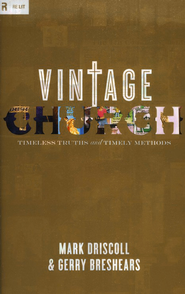Vintage Church: Timeless Truths and Timely Methods
 Mark Driscoll and Gerry Breshears, Vintage Church: Timeless Truths and Timely Methods (Wheaton: Crossway, 2008), 335 pages, ISBN 9781433501302.
Mark Driscoll and Gerry Breshears, Vintage Church: Timeless Truths and Timely Methods (Wheaton: Crossway, 2008), 335 pages, ISBN 9781433501302.
This is an engaging production by the dynamic, founding pastor of Mars Hill Church together with an experienced, theological teaching collaborator. It expresses the experimental fusion of mission focused churchmanship with a particular style of conservative, evangelical theology. This, indeed, is the power and potency in Driscoll’s approach. His dogmatic theology is clear, simple and acceptable to a large section of North American evangelicalism. What Driscoll offers is this theology, usually married to a conservative ecclesiology, combined with a very powerful contemporary, missional focus.
Driscoll challenges the collapse into relativism and pluralism that many would see associated with postmodern and emerging church movements. He offers a clear, doctrinal basis while allowing for an experimental missiology.
The potential weakness of this approach will be evident to some readers. For those who sense the validity of expressions from more than one doctrinal camp, this book will disappoint in dealing with nuances and varied flavours within the Word of God in Scripture. While many, for example, will have no quibble in agreeing to the propriety of stressing penal substitutionary atonement (p. 20), the appearance of favouring this to the extent of excluding other Biblical aspects to atonement that are valued and seen as basic by many, such as the stress of divinisation (2 Peter 1.4) found in Orthodox theology, may be problematic. That said, the book’s stress fits well with a perception of churchmanship that focuses on the priority of proclaiming a message of the Kingdom that is exclusively penal and crucicentric, together with a perception of church that emphasises agency over against modality.
In the book, there is a real attempt to develop a fuller perception of church and discipleship. Building on a perception of church modelled on the Reformed stress of Christ as ‘prophet, priest and king’, the authors comment that ‘the most common overemphasis is the (prophetic function’s) confessional reduction of the gospel to Jesus’ death, forgiveness of sin, and imputed righteousness leading to eternal; life in heaven. While this is true, it neglects Jesus’ exemplary life, resurrection, imparted life of regeneration, and the rich life of the missional community of the church on earth until we see him face-to-face’ (p.25).
This book is important because it expresses a theological journey that many, within the North American context, are finding faith through. For this reason in itself, it is worth engaging with.
Reviewed by James Purves
Preview this book: www.christianbook.com/Christian/Books/product_slideshow?sku=501302
Category: Ministry, Spring 2011


